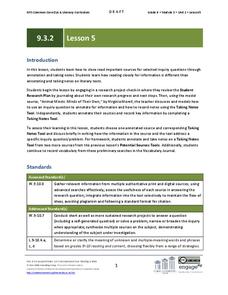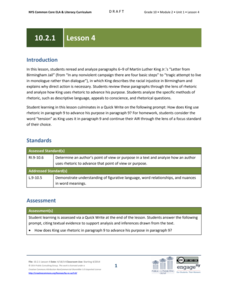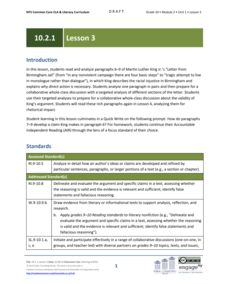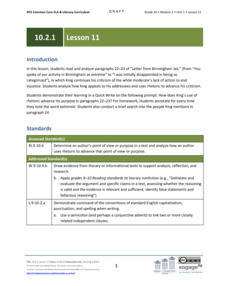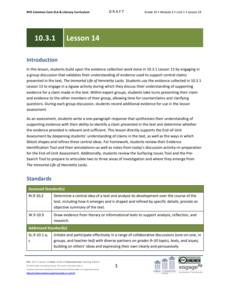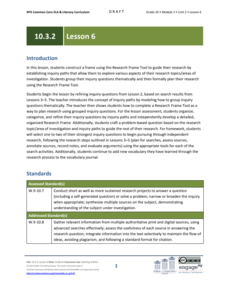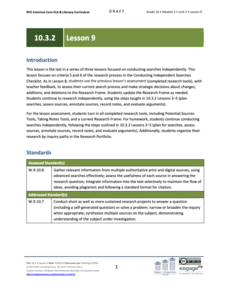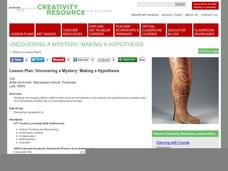EngageNY
Grade 9 ELA Module 2, Unit 2, Lesson 3
The manipulation of time is one of the most essential elements in Sophocles' Oedipus the King. As your language arts class participates in a jigsaw discussion activity, they work together to analyze the play's plot structure and...
EngageNY
Grade 9 ELA Module 1, Unit 1, Lesson 6
Can you tell everything about a character based on their actions? Delve into the prominent characters of Karen Russell's "St. Lucy's Home for Girls Raised by Wolves" with helpful reading tips and discussion questions. A thorough lesson...
EngageNY
Grade 9 ELA Module 1, Unit 1, Lesson 7
A story about feral girls raised by werewolves will have some interesting character development! Track how the girls and their teachers act, speak, and change with a lesson focused on Karen Russell's "St. Lucy's Home for Girls Raised by...
EngageNY
Grade 9 ELA Module 1, Unit 1, Lesson 17
Eighth graders demonstrate their understanding with the final assessment in a literary analysis unit based on Karen Russell's short story, "St. Lucy's Home for Girls Raised by Wolves." Having prepared for the assessment in the last few...
EngageNY
Grade 9 ELA Module 1: Unit 3, Lesson 17
Romeo and Juliet, Act 5, Scene 3, lines 139-170, is the focus of this day's lesson plan. Readers examine the dramatic irony in Juliet's comments and consider how "lamentable chance" caused by a "greater power" plays a role in the tragedy.
EngageNY
Grade 9 ELA Module 1: Unit 3, Lesson 20
The final session in this 20-lesson plan unit asks individuals to use their Quick Writes, discussion notes, worksheets, and annotated text to craft and support a claim about how Shakespeare develops either Romeo or Juliet as tragic heroes.
EngageNY
Grade 9 ELA Module 3, Unit 1, Lesson 4
Can dogs feel shame? Explore the anthropomorphic connection between human emotions and animal behavior—or lack thereof—with a activity about Temple Grandin's book, Animals in Translation. Ninth graders continue a close reading of chapter...
EngageNY
Grade 9 ELA Module 3, Unit 1, Lesson 9
Keeping animals relaxed and comfortable has numerous benefits. Explore Temple Grandin's unique perspective on animal behavior with a lesson that concentrates on a central idea within the text. High schoolers prepare for the final...
EngageNY
Grade 9 ELA Module 3, Unit 2, Lesson 5
Once you find and evaluate your sources, it's time to discern the most helpful information. In a research lesson plan based on questions derived from Temple Grandin's Animals in Translation, practice annotation and taking notes.
EngageNY
Grade 9 ELA Module 3, Unit 2, Lesson 10
Ninth graders continue their inquiry-based research projects focused on the topics in Temple Grandin's Animals in Translation. After formulating, honing, and adapting their research frames in the previous lessons, learners select...
EngageNY
Grade 9 ELA Module 3, Unit 2, Lesson 9
Part of being a strong researcher is knowing if you're headed in the right direction. Class members study their research frames formulated in the previous lessons of the unit and decide what parts of their inquiry paths need revision or...
EngageNY
Grade 10 ELA Module 2: Unit 1, Lesson 4
Just read between the lines. Scholars analyze rhetorical devices in Martin Luther King Jr.'s letter by first discussing them with guided questioning. They then complete a rhetorical impact tracking tool before finishing the lesson plan...
EngageNY
Grade 10 ELA Module 2: Unit 1, Lesson 3
What are the four basic steps of any nonviolent campaign? Readers discover the answer by analyzing a letter written by Martin Luther King Jr. Lesson three involves discussion and analysis of King's claims in paragraphs seven through...
EngageNY
Grade 10 ELA Module 2: Unit 1, Lesson 11
Choose your words carefully. Martin Luther King Jr. carefully chooses his words to provide evidence to support his claim about segregation. Scholars work in pairs to discuss previous lessons, complete homework assignments, determine the...
EngageNY
Grade 10 ELA Module 3: Unit 1, Lesson 14
Do you have a valid claim? Learners become judges of claims as they expand on evidence collected in lesson 13 and develop claims. They present claims to one another and respond to questions and counterclaims. To finish, individuals...
EngageNY
Grade 10 ELA Module 3: Unit 2, Lesson 6
Choose your path carefully. When beginning research, learners must figure out which inquiry path to follow. After determining a path, scholars guide their research based on the chosen theme to further refine the questions they...
EngageNY
Grade 10 ELA Module 4: Unit 1, Lesson 6
It's time to tie it all together. Scholars reflect on the series' past five lessons about Death of the Pig. They examine how E.B. White develops a central idea throughout the essay before responding to a writing prompt.
EngageNY
Grade 10 ELA Module 3: Unit 2, Lesson 9
Do you know what the plan is? Scholars are now ready to complete the final instructional activity of independent research before finalizing their plans. Ultimately, they turn in all research tool sheets and frames and organize their...
Curated OER
Lesson: Uncovering a Mystery: Making a Hypothesis
The class is presented with an image of a hand-carved leg. They act as art historians and hypothesize as to the purpose, nature, and creators of this amazing wooden leg. They compose journal entries from the point of view of an art...
ReadWriteThink
Comics in the Classroom as an Introduction to Narrative Structure
A picture is worth a thousand words, but a comic strip combines both images and words for the ultimate narrative effect. After reading The Three Little Pigs and deciphering the plot elements, elementary readers work through four...
Curated OER
Lesson Plan: Carving Through History
Peek into the art and history of ancient Mexico by analyzing the artifact Stone Serpent Heads. Learners examine images of the piece, discuss its origin, history, and significance. They experience the carving process by creating similar...
Denver Art Museum
Lesson: Act 1: Purple Bathrobes Attend and Opera
I really like this idea. Upper graders discover the connection between art and theatre by first analyzing the artists' choices and motivation in creating the installation piece, Four Purple Velvet Bathrobes. In groups, they write one-act...
Curated OER
Genre Lesson: Realistic Fiction
As scholars begin identifying stories as realistic fiction, its important they see many examples to solidify their concepts of this genre. Readers begin with a personal connection, thinking of television shows they like and determining...
Idaho State Department of Education
Lessons for Social Studies Educators
Point of view, purpose, and tone: three concepts readers of primary and secondary source materials must take into account when examining documents. Class members view a PowerPoint presentation and use the SOAPS strategy to identify an...
Other popular searches
- Art Lessons Primary
- Visual Art Lessons
- Visual Art Lessons Symmetry
- Elementary Art Lessons
- Compass Rose Art Lessons
- Art Lessons Primary Penguins
- Edible Art Lessons Primary
- Picasso Art Lessons
- Art Lessons Primary Easter
- 3d Art Lessons Primary
- Christmas Art Lessons
- Ceramic Art Lessons










